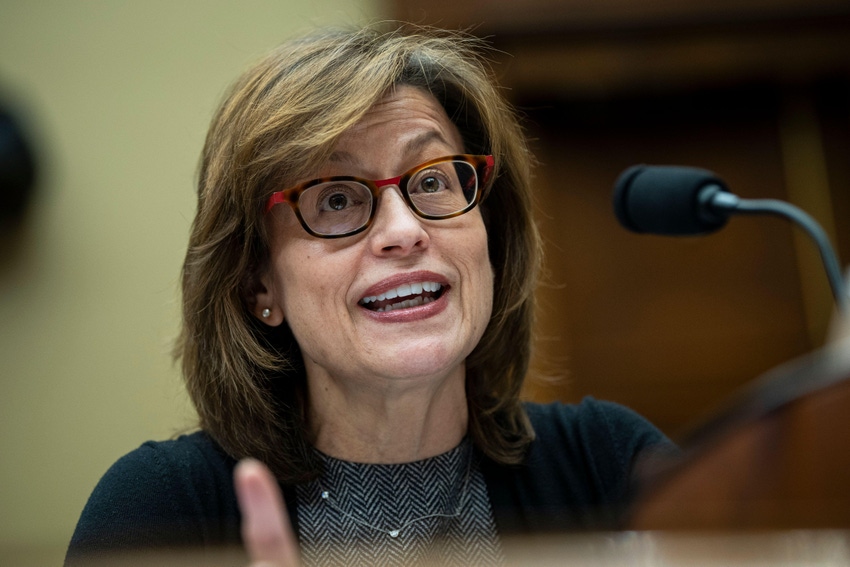FCC Commissioner stresses economic importance of the ACP
At an event on Monday, FCC Commissioner Anna Gomez used her full remarks to rally support for the Affordable Connectivity Program (ACP), stressing its role in US economic success and the BEAD program.

FCC Commissioner Anna Gomez delivered remarks at the State of the Net 2024 conference in Washington, DC, on Monday, in which she focused exclusively on the importance of the Affordable Connectivity Program (ACP) – specifically, the economic benefits of the program and the detrimental effects if it ends as expected this May.
Her speech was notable because it came just after the program's enrollment freeze last week, due to dwindling funds.
In her keynote address, Gomez, who was confirmed as the third Democrat on the FCC in September, called it "a really bad idea" to let the ACP expire: "Bad for our economy and bad for families all across this country," she told the audience.
"The ACP is the most successful tool we've ever had to closing the digital divide because it finally addresses the long overlooked yet critical affordability piece of the puzzle," said Gomez, adding that the 23 million households enrolled "prove definitively that too many Americans have been missing out on the opportunities of the digital age because they couldn't afford a home broadband connection."
The ACP currently provides a $30/month subsidy for broadband for eligible low-income households, or $75/month for tribal households. That includes over 5 million households that were not connected prior to the ACP, added Gomez, citing research compiled by the FCC.
"Many more had what can only be described as precarious connectivity – connectivity that could easily be lost if the family had to make the hard choices on tight budgets in any given month," she said.
Gomez further cited other crucial stats, including that nearly half of all ACP subscribers are military families ("Considering their sacrifices for our country, it hardly seems right to yank away the support for which they've signed up," she said), and 4 million are senior citizens. Similar stats were cited in a fact sheet distributed by the White House last week in support of the program.
'Downstream effects'
But the bulk of Gomez's comments focused on the ACP's economic benefits – and the detrimental impact losing the subsidy will have on the $42.5 billion Broadband Equity Access and Deployment (BEAD) program.
The ACP ending will have "downstream effects" on the economy, Gomez said, in that it will "slow economic growth, increase cost to the government and cause stranded investments in rural areas. It is, as they say, penny wise and pound foolish."
She pointed to stats showing that nearly 50% of ACP subscribers have used broadband service to apply for jobs or to work, and 72% have used it for telehealth services.
"Currently we have 9 million job openings" in the US, Gomez said. "The main way to apply for the overwhelming majority of those jobs is an online application process. If we risked the ability of one-sixth of US households to get online, that's only going to make it harder for businesses to find qualified applicants," she added.
And on telehealth use, she noted the "significant overlap" between ACP subscribers and Medicaid participants, stressing that since telehealth visits are statistically less expensive than in-person visits, the cost of Medicaid will go up if its participants lose the ACP benefit and thus the ability to afford broadband for telehealth.
"Allowing ACP to expire would not only have negative economic impacts, it would also lead to increases in government spending," Gomez said.
On BEAD
Gomez further used her comments to directly tie the ACP to the BEAD program, and to emphasize how – without affordable access – BEAD builds will suffer. Both the ACP and BEAD were created and funded through the Infrastructure Investment and Jobs Act (IIJA) of 2021, and BEAD participants are required to offer a low-income plan. That's a far more challenging prospect if the ACP goes away.
"Without affordability, we risk some of the historic $42.5 billion investment becoming stranded," said Gomez, noting the crucial role of the ACP in low-income rural areas in particular.
"The likely take rate is a critical piece of providers' business plans. This is not complex math. Without ACP, fewer households can afford service, and this will impact the economics of deploying broadband infrastructure," she said. "Subscribership concerns could result in less rural areas being served and the historic investment through BEAD buying less build out. And some build out may be unsustainable without sufficient subscribership."
Gomez's comments on BEAD followed remarks from NTIA Administrator Alan Davidson, who was interviewed at the conference earlier in the day and said it would be "very damaging to the economy" if the ACP goes away. On BEAD's aim of universal connectivity, Davidson said: "Without the ACP we have a hard time reaching that goal."
ACP negotiations update
The fate of the ACP currently rests with Congress. Without action to fund it, the subsidy program will end this May.
As of last week, the Affordable Connectivity Program Extension Act – which was introduced in January to temporarily fund the program with $7 billion – gained additional co-sponsors and now has 12 Republicans, in addition to 12 Democrats. However, it's unclear if House Speaker Mike Johnson will allow the bill to come to the floor. Notably, Louisiana has the most ACP participants of any state in the country, including 29% of the households in Johnson's congressional district, according to a map from the Digital Progress Institute.
Other legislative efforts are reportedly in the works: According to a note this week from Blair Levin, writing for New Street Research (subscription required), with the ACP extension legislation now having 12 Republican co-sponsors in the House, plus the support of all Democrats, the bill could potentially be brought to the floor through a discharge petition, which would enable a vote without the House speaker scheduling it. Levin calls this move unlikely, but "now a mathematical possibility."
Additionally, another bipartisan move is reportedly underway in the Senate to introduce an ACP bill that would "both tweak and extend the ACP," said Levin. That legislation has yet to be introduced but the effort could see the ACP stay alive as a smaller program that benefits fewer people.
According to Levin, that legislation, if passed, "would likely reduce the eligibility and amount but would nonetheless keep the program alive and reduce the financial and political impact on the ISPs that a complete wind down would entail."
Read more about:
ACPAbout the Author(s)
You May Also Like












